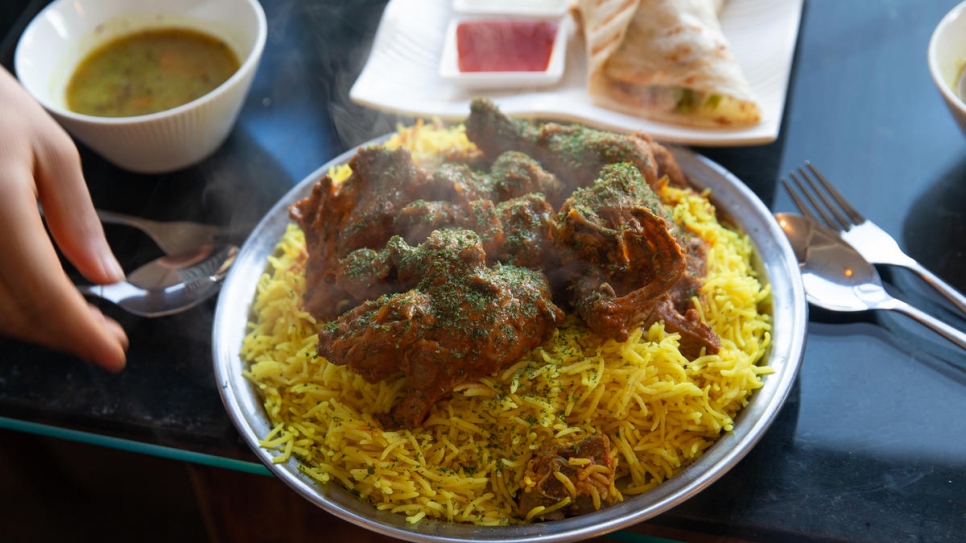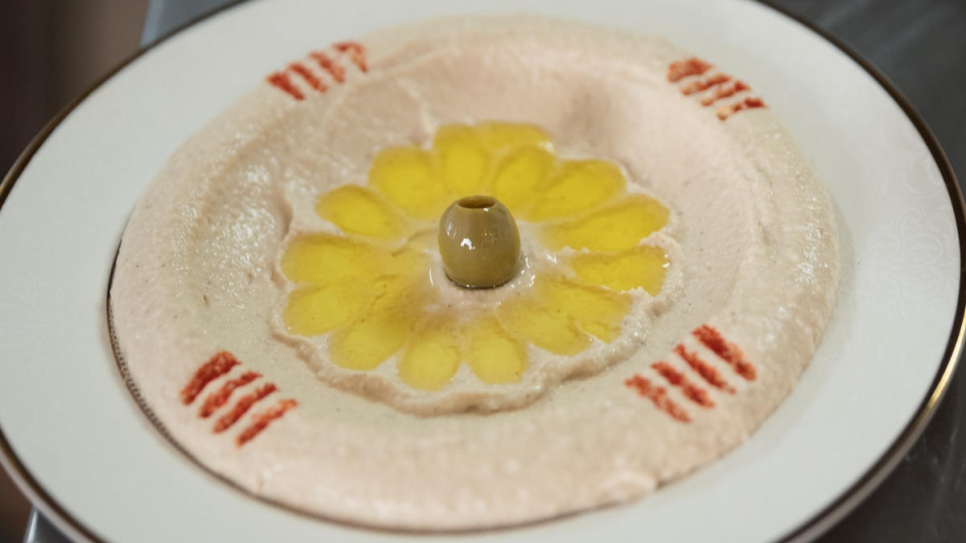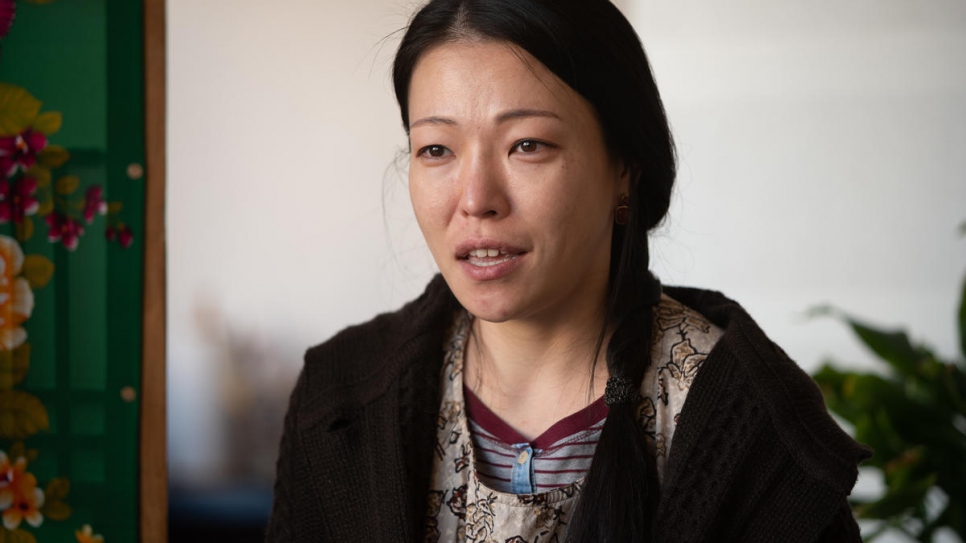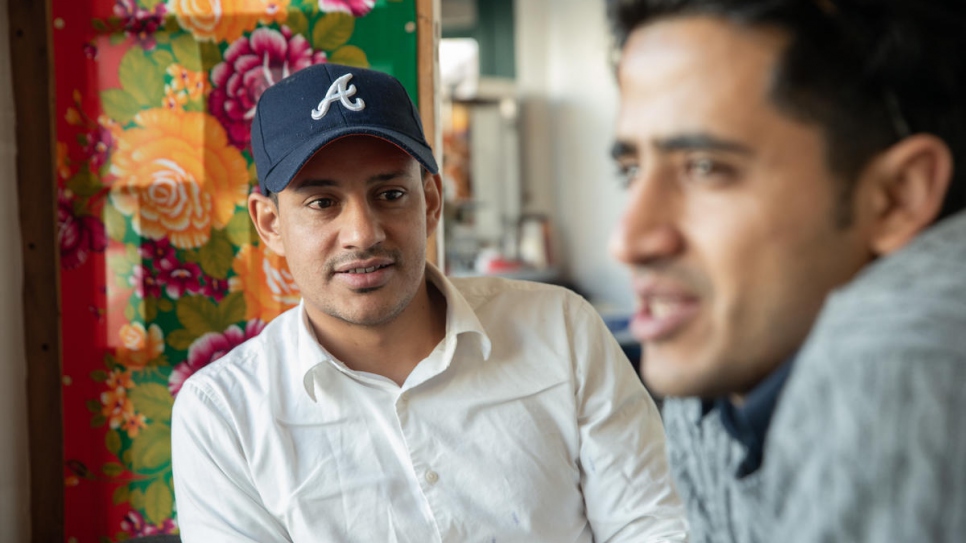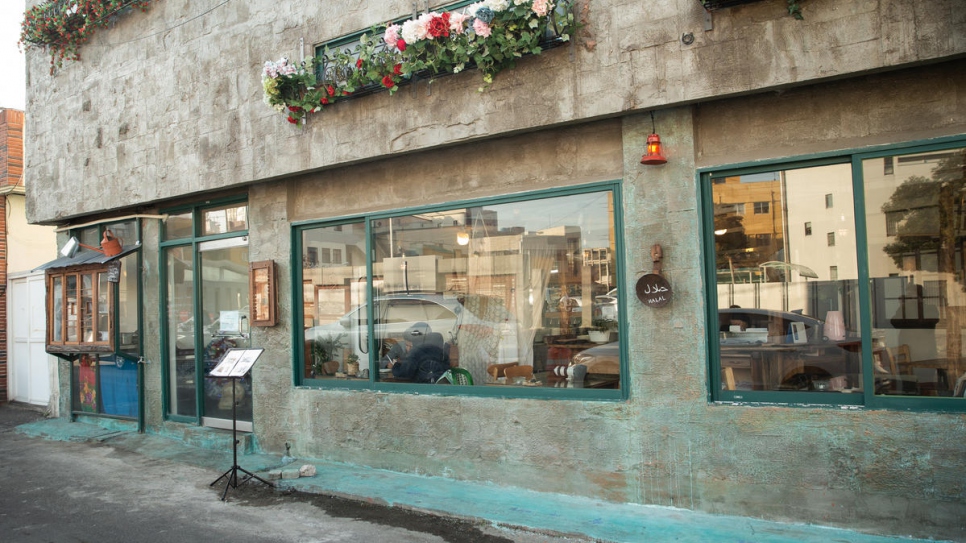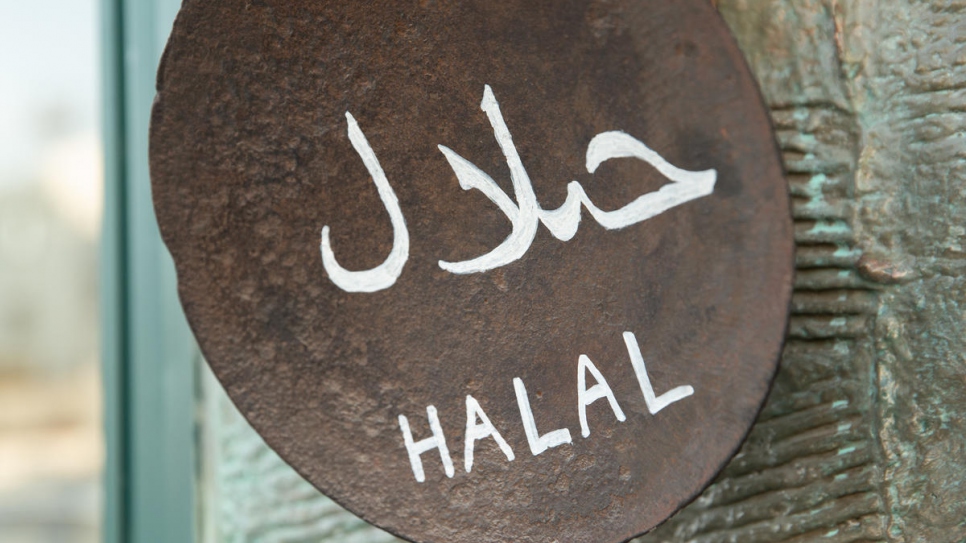Yemeni restaurant wins over Korean palates and hearts
Diner staffed by Yemeni chefs and waiters on South Korea's Jeju Island brings refugees and their hosts together over food.
Chef Mohammed Ameen Almaamari (left), owner Ha Min-kyung and waiter Sami Al-baadani pose at Restaurant Wardah.
© UNHCR/Neil P George
Before a Yemeni restaurant opened in this South Korean resort island last year, diner Kim Hee-yeol knew little about either the food or the people from the war-ravaged country.
But after sampling the kebabs, flatbread and hummus at Restaurant Wardah, prepared by refugee chefs and served up by the eager Yemeni wait staff, she is getting to know both.
“Eating the food cooked and served by the people makes me feel that I know Yemen better,” says Kim, who was among a mixed crowd of Koreans, Yemenis and tourists on a busy Friday evening at Wardah.
“I was moved by the waiter who tried to take the order in Korean using a translation App. They are really trying hard to adapt to the country,” she says.
“Eating the food cooked and served by the people makes me feel that I know Yemen better.”
Last spring, some 500 Yemenis fled the civil war raging at home and arrived on Jeju, a bustling tourist island off the southern coast of South Korea with a visa-free-policy.
Their somewhat unusual mass arrival sparked concerns both on the island and the mainland, where Koreans had little exposure to either refugees or Muslims – although the restaurant is now changing that, one meal at a time.
Wardah, which means “flower” in Arabic, is the brainchild of a local restaurateur and musician Ha Min-kyung, who decided to open up her music studio to shelter the Yemenis after learning from a social media group that many had started sleeping rough as their savings ran out.
“The Yemenis thanked me so earnestly for something that was so easy to do that I felt almost ashamed,” says the 38-year-old, her eyes turning watery at the memory. “The studio was empty most of the time and all I had to do was to unlock it. How difficult is that?”
After spending months helping and supporting Yemeni asylum-seekers and becoming their friend, Ha realized that many of them were not eating properly as it was difficult to get proper halal food in Jeju.
With support from her Yemeni and Korean friends, she decided to open the island’s first Yemeni restaurant, giving it the name Wardah, which is also a name that the Yemenis gave her.
The eatery now serves up entirely halal food including kababs, rice, falafel and agdah chicken, as well hummus and other Middle Eastern staples. Yemeni customers get a special 50 per cent discount.
“The Yemenis thanked me so earnestly for something that was so easy to do.”
“This is a taste of home,” says Mohammed Ali, 37-year-old asylum-seeker and Wardah regular. “Outside, I only ate vegetables because I wasn’t sure if the chicken sold in the Korean shops were proper halal. I don’t worry about that here.”
Among frequent diners is Nathan Dewan, from the United States, who has been living on the island for about four years teaching English at a Korean public school.
“Food is something that we can all relate to and also is a great medium for the sharing of a personality and a story … It is wonderful to have this place for the bridging of cultural gaps,” says Nathan.
Ongoing conflict and dire conditions in Yemen have displaced an estimated 2.3 million people within the country and more than 20 million are in desperate need of humanitarian aid. Some 70,000 people have fled abroad in search of safety.
UNHCR, the UN Refugee Agency, is on the ground in Yemen, actively providing urgent humanitarian assistance. It does not consider that any person from Yemen can safely return to his or her home country at this time.
For Ha, seeing her restaurant filled with Koreans, Yemenis and visitors all interacting over food, has been an unexpected delight.
“I would have laughed if someone told me last year that I was to open a Yemeni restaurant,” she says. “Before the Yemenis started to arrive here, I didn’t even know there was a country called Yemen. I had no idea who refugees were.”
Since 1994, Korea has received nearly 49,000 asylum claims and currently hosts about 2,900 refugees and humanitarian status holders from various countries of origin including Pakistan, China, Syria and Yemen.
The South Korean government granted temporary humanitarian status to the majority of the 484 Yemenis who sought asylum on the island, and recognized two as refugees. However, challenges remain, particularly for 56 asylees whose claims have been rejected, although they have the right to appeal and thus will not be repatriated immediately.
“We did not come to Korea for money or for better jobs. We came because Korea is a safe country."
“We did not come to Korea for money or for better jobs. We came because Korea is a safe country and because Korea was our only option,” said Sami Al-baadni, 23-year-old Yemeni waiter at the restaurant. “We cannot return now or even in the near future. If we return, we will die.”
For his part, Mohammed Ameen Almaamari, Wardah’s 35-year-old chef, wants peace in Yemen and the chance to go home in safety. Meanwhile, he asks Koreans to see Yemenis as human beings, “beneath the different race, culture and religion.”
All the signs are that the restaurant is helping to achieve that hope. After dining at Wardah, Kim Hee-yeol becomes reflective about the need to do more to help refugees in their time of need.
“We can be concerned about the unknown, but that is not the fault of the unknown is it?” she notes. “I wish the government would increase its efforts in persuading and reassuring the people about Korea’s responsibility in protecting refugees.”

